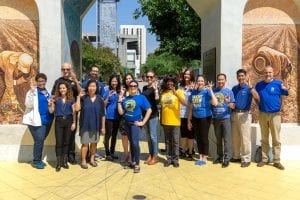Dr. Mary A. Papazian
By now, most people have at least passing knowledge of the federal legislation known as Title IX that was passed as part of the federal Education Amendments in 1972. Simply put, Title IX is federal civil rights legislation that prohibits discrimination on the basis of sex in any education program or activity that receives federal funding. In the early years after its passage, Title IX was primarily known as an equity protection law for girls’ and women’s sports. Now, Title IX also is rightfully known as the federal protection against discrimination that results from sexual misconduct in schools and colleges.
With issues such as sexual assault and the #MeToo movement dominating news headlines in recent months – coupled with our observance of Domestic Violence Awareness Month in October – I thought it was an appropriate time to discuss Title IX and what it means for universities like San José State.
In our present environment, Title IX is about much more than the equitable treatment of girls and women in sports, though that remains an important issue. The legislation also includes prohibitions of sex- and gender-based harassment, discrimination, stalking, dating violence, and sexual misconduct by and upon students, faculty, and staff. Unfortunately, Title IX remains as vital and necessary today as when it was first passed in 1972. SJSU, in fact, has an entire team devoted to Title IX issues and offers myriad resources that are described on our Not Alone website.
Our Title IX team is responsible for addressing all Title IX-related complaints when they arise. As part of the California State University system, we adhere to California Executive Orders 1096 and 1097, which set the standard for Title IX responsibilities and actions including overall campus safety. The Executive Orders lay out investigation processes, notifications, and required actions that ensure due process and confidentiality for all parties involved, whether they are students, faculty, or staff.
Depending on a variety of factors, complaints may lead to a formal investigation. Some cases may qualify for early resolution. In some cases, including those involving alleged sexual assault, battery, or domestic violence, the Title IX team may work in parallel and in coordination with law enforcement.
Title IX-related incidents can, understandably, be overwhelming and emotionally taxing for both the person lodging the complaint as well as the accused. Our Title IX office partners with many on-campus resources to help guide and support those individuals through the process as smoothly as possible. Whether it is with academic accommodations, housing, counseling, survivor advocacy, respondent consultation or other services, our Title IX team is there to help.
When we talk about developing an engaged campus community – and we talk about that a lot! – this is a perfect example. We encourage students to have conversations with their friends about “affirmative consent,” about healthy relationships, and related issues. We encourage students to attend educational workshops and events hosted by a collaborative of Student Involvement, Intercollegiate Athletics, Gender Equity Center, Wellness Center, Residence Life, Title IX, and the Office of Diversity, Equity, and Inclusion.
Our faculty, staff, employees, and third party affiliates also are subject to and protected by Title IX and the Executive Orders and as such receive training on the responsibilities and duties to report sexual misconduct as well as not to perpetrate sexual misconduct. The SJSU Title IX team also works with members of my Cabinet and each division on responsibilities and protocols for reporting incidents.
As talented and dedicated as our Title IX office is, our fellow Spartans are the best resource at SJSU for ensuring that we remain a safe, caring, and inclusive community.
While we cannot eliminate all sexual misconduct on our campus, our overarching goal at San José State University is to be known as one of the safest and most responsive campuses in the country where all students have an equal opportunity to succeed and thrive. While that is a lofty goal, I believe it is an attainable – and realistic – objective.
